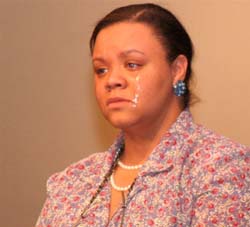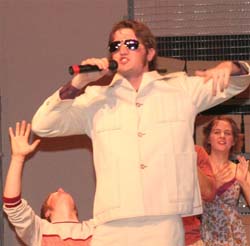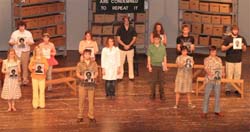(Yankton High School in Yankton, South Dakota is a 9-12 school with approximately 1200 students. Yankton performed The People’s Temple at the South Dakota State Play Festival in February of 2008. The festival was held in Aberdeen, SD at Northern State University. Even though temperatures in February in Aberdeen seem sub-arctic, the theatre was filled. The following is a story written by the play’s director, Terry Winter.)
Producing The People’s Temple for the South Dakota State Play Festival was one of the more profound High School Theatre experiences I have enjoyed during my almost forty years as a high school instructor. Yankton High School has always striven to produce cutting edge theatre for our festival, priding ourselves in being among the first to bring certain titles to the high school stage. Our performances have included Peter Brooks’s Conference of the Birds, Peter Shaffer’s Equus, Paul Foster’s Heimskringla, The Stoned Angels, Timberlake Wertenbaker’s Our Country’s Good, Mary Zimmerman’s Metamorphosis and The York Cycle Mystery Plays. At the outset of the Iraq war, Yankton staged a production of The Trojan Woman set in modern Iraq.
We have always challenged our audiences and tried to make choices which will enrich and expand our students’ Midwestern horizons. I think it is safe to say that our experience with The People’s Temple was, in many ways, one of our most intense and transforming dramatic journeys.
Back in 2005, I learned of a group of actors, writers and survivors from Jonestown working under the guidance of Leigh Fondakowski to create a script addressing the Peoples Temple experience. I was instantly intrigued. I had not thought about the Peoples Temple tragedy for years, but memories surfaced that were sharp, clear and troubling. Having long admired previous work by Ms. Fondakowski such as The Laramie Project, I set off in search of a script. Finally in 2007, as a gift for my 60th birthday, my assistant director procured scripts from the Guthrie Theatre production. At last we were able to read and assess the script.
It was compelling material, of course – the ghosts of Jonestown stepped off the page and onto the stage, driven by the living words which had been opened from long dead files. I knew that I wanted to do the show, but as I and my assistants discussed the script, we all registered concerns about being able to responsibly cast the show.
Our most immediate problem was that our Midwest high school did not appear to have the culturally and racially diverse student body necessary to cast the show. Specifically, I was concerned about finding enough black students to speak honestly to the racial subtext which is an important element of the play and Jim Jones’ church. Still, other script choices paled in comparison, and in December, after Ms. Fondakowski’s New York agent gave us permission for the show’s production, we started auditions.
The state festival production is a high priority for our student body, and we had about 65 students audition for the show. Although I had lobbied a number of our black students with whom I had had classroom contact, most were initially leery of the project. One student was even somewhat offended because he felt my interest was only due to his race. I should mention at this point that we have a very open program and that students from all ethnic backgrounds had been cast in our shows. However, at the close of auditions, I had only three black students prepared to do the show. The cast was a very talented group, and their reaction to the script and auditions had been very positive. Consequently, we began rehearsals – reading in several of the required black roles in the hope that we might be able to recruit other students down the line. And that is exactly what happened.
After a couple of weeks of rehearsal, the star receiver of our football team, who happens to be a black student, came to rehearsal unannounced and watched a practice. He then asked me whether we had a part for him. Following his lead, several other black students showed up, and we had our cast. And what a cast it was. We still didn’t have the student distribution to meet the proportions indicated in the script, but we managed to cover most of the principal characters. It helped that this was a timed contest entry that required some cutting of the script and that to a certain degree we could play to our strengths.
Our preparation for The People’s Temple was an amazingly rewarding exchange of cultural and personal experiences. From the outset, I was amazed and gratified by the cast’s commitment to and empathy for the Jonestown story. Every rehearsal brought forth one of the students whose online research told us more about the people of Jonestown. As the students were assigned their different roles, each worked to find out as much as he or she could about that character’s real life, moving well beyond the script in terms of uncovering information.
Initially, of course, the cast was mesmerized by the whole issue of a cult that could have such power over its members, and could be convinced to follow through with such a horrific end. I myself was first attracted by the potential for high drama that such a visceral event could inspire.
But then, something else happened. As we worked with The People’s Temple, we were struck by the fact that the soul of the play seemed to be how much people need other people, and that people will do anything for someone who will give them a sense of belonging. It was this sense of yearning and displacement that our cast started to identify as the source of their characters. As rehearsals continued, the actors were less and less consumed by the ending, and more and more bound by a sense of personal compassion for the characters they played, and a very real grief for the people who were lost. There was an almost eerie sense of identification among the cast that carried the people of Jonestown into their everyday lives and school experiences. And as this happened, more and more of our student body started to attend rehearsals. This is not something I generally allow or encourage, but they were so quiet and respectful, that they became part of the rehearsal as well.
The role of Jim Jones and the actor who played him was a special challenge – a role so outside the realm of a high school actor’s experience that at first, we only found its superficial center. The young man playing the role at first crafted the character around Jones’ sonorous voice – his mirrored sun glasses and hypnotic vocal delivery. But, that didn’t give us much. However, he was a diligent student and a serious actor. We discussed the man for hours, and as he became more and more aware of the good things that Jones had done – the reasons he had become important, even indispensable to hundreds of people – the character became more human and curiously sympathetic. And as that happened, the bonds that joined the other actors to him become more personal, and much more frightening.
Discussion is always an important element in the rehearsal process, but I can rarely remember a show where this was as essential as it was for The People’s Temple. We talked about the plays characterization of John and Barbara Moore, the parents of two women who died in Jonestown, and the loss of children. We discussed Jones’ relationships with his own children and what he had asked them to do. We talked about the group dynamics that can take control of people held in isolation. We talked about what makes the “sense of family” beyond blood ties. We talked about the use of religion and the dangers of messianic devotion. And we talked a lot about people’s needs for understanding, tolerance and a sense of belonging and how Jim Jones’ church had fulfilled those voids in its people’s lives. We talked about letting the characters speak for themselves.
During the rehearsal process, a remarkable thing happened. I personally watched kids who, for the past three years, had exhibited hostility and aggression toward each other – who had thrown the stereotypical high school slurs at each other and their activities (“Drama Queen” “Dumb Jock”), and saw them first establish an uneasy peace and then become cooperative and friendly. I watched them become more respectful, more tolerant, and infinitely more compassionate.
The cast couldn’t seem to get enough rehearsal. A senior who had never before been in a play (a country boy whose pick-up had the requisite gun rack) and whose home was a good half-hour drive from school never missed a practice. Snow and blizzards never made a difference. During Christmas vacation, they volunteered to rehearse on Christmas day. I nixed that, but as I say, I got the point: they couldn’t seem to get enough. Their level of commitment was remarkable. I have rarely watched a cast “discover each other” with the positive results elicited from working on this script. They talked about race, family, sexual orientation, religion, friendship – they talked about it all and this dialogue extended beyond the rehearsal process and cast and into the general student body. At the end of the school year, each cast member attended the graduation celebration for each senior cast member. It was extraordinary.
Another element of The People’s Temple that should be discussed is the importance of the music. The hymns – the black spirituals and the revival meeting folk music – provided a rhythmical touchstone that held the show together. We had a boy with a beautiful, soft tenor voice who opened and closed the show by singing “Walk a Mile in my Shoes.” It was a crystal moment during which our audience held its breath.
The collective persona that the actors embraced extended to our techies. Their pride in design and construction brought them to every rehearsal, even when we weren’t working the tech side of the show. They were always asking the actors what they needed – searching for the most obscure but perfect prop. They were almost fanatically committed to facilitate the actors’ needs. It seemed like the mystical bonds of Jonestown had infected the entire company.
The reception our show received was equally remarkable. Our public performances were packed. Students brought their parents and friends. History classes talked about Peoples Temple and Jonestown. I was somewhat concerned that the mature themes and language of the play, not to mention the potential criticism of our treatment of racially sensitive material as well as church dogma, could upset our administration or school board members. That was not the case. Our principal who is a Native American said he thought the whole school should see the show. After each performance the audience sat still in stunned silence. Many were quietly weeping. Numerous letters were written, commending the project. Best of all, many of our students traveled the 300 miles to the Festival site to again watch and support the show.
Yankton’s production of The People’s Temple played to a packed house at the South Dakota State Festival at Northern State University in Aberdeen, South Dakota. The audience’s reception was once again extraordinary. The festival invites three adjudicators to assess each performance. Then competing shows are rated as Superior, Excellent or Good and acting awards are given. In critique, one commentator took issue with the presentational style of the script – something we were rather surprised about. However, the other two adjudicators raved about both the script and the performances. The show was very much the talk of the festival. I don’t think that our students ever were so well received or persistently complimented. The show received a Superior rating and the entire cast was named a Superior Ensemble.
The People’s Temple has been hard for us to let go. I often have my cast choose their favorite line or passage, something that serves as a touchstone for the essence of the play. Their choice was Stephan Jones line, close to the end of the play. “It’s a bittersweet gift, your memory. I really do miss those people. And I’ve often referred to them as the people I didn’t know I loved, because what comes back to you, when you’re in that kind of grief, is all those things you took for granted about them.”
I think that we learned to love the people of The People’s Temple, and we will ever be grateful to Ms. Fondakowski and her collaborators Greg Pierotti, Stephen Wangh, and Margo Hall for this beautiful play.
(Terry Winter can be reached at twinter@ysd.k12.sd.us.)


